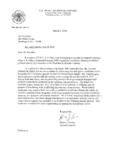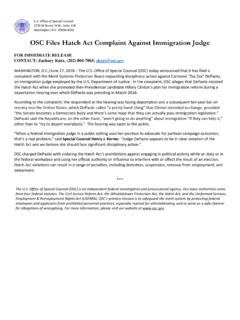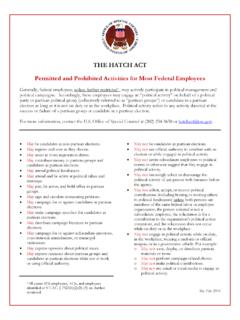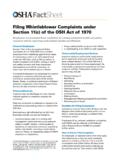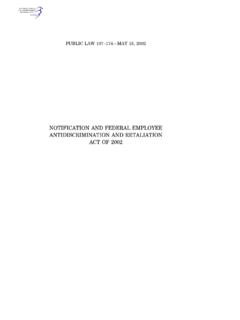Transcription of The U.S. Office of Special Counsel’s Role in Protecting ...
1 The Office of Special Counsel s Role in Protecting Whistleblowers and Serving as a Safe Channel for Government Employees to Disclose Wrongdoing The Honorable Carolyn N. Lerner Special Counsel Office of Special Counsel1 Jason M. Zuckerman Senior Legal Advisor Office of Special Counsel DISCLAIMER: This paper is offered only for educational and informational purposes and does not constitute legal advice, a statement of agency policy or a legal opinion. The material is a summary of the area of law and does not purport to exhaust its subject. The reader can use the outline as a tool for further research, but this paper should not be relied upon or cited in any proceeding, including in litigation before the Merit Systems Protection Board or the Court of Appeals for the Federal Circuit. This paper does not create, and shall not be construed as creating, any right or benefit, substantive or procedural, enforceable at law by any person against the United States, its agencies, its officers or employees, or any other person.
2 1 The authors acknowledge the assistance of Gregory Giaccio and Grace Williams in preparing this outline. 1 TABLE OF CONTENTS I. Establishment of OSC 2 II. OSC s Independence and Powers 3 III. Investigating and Resolving Complaints of whistleblower retaliation 4 IV. Obtaining Corrective Action for Whistleblowers 5 V. Pursuing Disciplinary Action 7 VI. Serving as a Secure Channel to Disclose Wrongdoing 9 VII. Scope of OSC Jurisdiction in whistleblower retaliation Cases 10 VIII. Prohibitions Against whistleblower retaliation 13 A. whistleblower retaliation , 2302(b)(8) 13 1. Categories of Protected Disclosures (Element 1) 13 2. Reasonable Belief 16 3. Specificity Requirement 17 4. No Proscribed Channel for Whistleblowing 17 5. Perceived Whistleblowing 21 6. Exception to Protected Conduct 21 7.
3 Covered Personnel Actions (Element 2) 22 8. Actual or Constructive Knowledge of the Disclosure (Element 3) 24 9. Protected Disclosure was a Contributing Factor (Element 4) 25 10. Agency Burden 26 B. retaliation for Exercising Whistleblowing, Complaint, Appeal or Grievance Rights, 2302 (b)(9) 27 1. Protected Activity (Element 1) 27 2. Cooperating With or Disclosing Information to IG or OSC 32 3. Refusing to Obey Order Requiring a Violation of Law 32 4. Personnel Action and Knowledge (Elements 2 and 3) 33 5. Causal Connection (Element 4) 33 6. Evolving Issues in (b)(9) Cases 35 IX. Procedural Issues 36 A. Three Avenues for MSPB Adjudication of a whistleblower Claim 36 1. Affirmative Defense in an Otherwise Appealable Action Case 36 2. Individual Right of Action Appeals 36 3. OSC Original Jurisdiction Cases 37 B. Election of Remedies 38 C.
4 OSC Deferral to EEO Process 39 D. Stays 39 E. Legal Representation in OSC Investigations 40 F. OSC Deferral to MSPB Proceedings 40 2 The Office of Special Counsel (OSC) is an independent federal investigative and prosecutorial agency whose primary mission is to safeguard the merit system2 by Protecting federal employees and applicants from prohibited personnel practices (PPPs), especially reprisal for whistleblowing, and provide an independent, secure channel for disclosure and resolution of wrongdoing in federal OSC investigates allegations of reprisal and is authorized to seek corrective action to make a whistleblower whole and to initiate disciplinary action against civilian government officials who commit PPPs. I. Establishment of OSC In the wake of the Watergate scandal, and well-publicized allegations of retaliation by agencies against employees who had blown the whistle on wasteful defense spending and revelations of partisan political coercion in the federal government, Congress enacted sweeping reform of the civil service system in a bill known as the Civil Service Reform Act (CSRA).
5 4 The primary purpose of the CSRA providing review of agencies adverse employment actions was to ensure that [e]mployees are .. protected against arbitrary action, personal favoritism, and from partisan political coercion. S. Rep. No. 95-969, at 19 (1978), reprinted in 1978 2723, 2741. To achieve those goals, Congress identified merit system principles and PPPs designed to ensure, among other things, protection of whistleblowers, open competition for selections and promotions, pay comparability, efficient use of the work force, and fair treatment of government 2 The merit system in federal employment refers to laws and regulations designed to ensure that personnel decisions, including hiring and discipline, are taken based on merit. 3 OSC also enforces the Hatch Act provisions on permissible and impermissible political activity by government employees and protects the employment and reemployment rights of military veterans and reservists under the Uniformed Services Employment and Reemployment Rights Act of 1994 (codified at 38 4301 4335).
6 4 Civil Service Reform Act of 1978 (CSRA), October 13, 1978, Pub. L. No. 95-454, 92; see also Fong, Bruce D., whistleblower Protection and the Office of Special Counsel: The Development of Reprisal Law in the 1980 s, 40 Rev. 1015, 1017-18 (1991). Stat. 1111-1116. 5 The nine merit system principles are set forth at 5 2301(b): (1) Recruitment should be from qualified individuals from appropriate sources in an endeavor to achieve a work force from all segments of society, and selection and advancement should be determined solely on the basis of relative ability, knowledge, and skills, after fair and open competition which assures that all receive equal opportunity. (2) All employees and applicants for employment should receive fair and equitable treatment in all aspects of personnel management without regard to political affiliation, race, color, religion, national origin, sex, marital status, age, or handicapping condition, and with proper regard for their privacy and constitutional rights.
7 (3) Equal pay should be provided for work of equal value, with appropriate consideration of both national and local rates paid by employers in the private sector, and appropriate incentives and recognition should be provided for excellence in performance. (4) All employees should maintain high standards of integrity, conduct, and concern for the public interest. (5) The Federal work force should be used efficiently and effectively. (6) Employees should be retained on the basis of the adequacy of their performance, inadequate performance should be corrected, and employees should be separated who cannot or will not improve their performance to meet required standards. (7) Employees should be provided effective education and training in cases in which such education and training would result in better organizational and individual performance. (8) Employees should be (A) protected against arbitrary action, personal favoritism, or coercion for partisan political purposes, and (B) prohibited from using their official authority or influence for the purpose of interfering with or affecting the result of an election or a nomination for election.
8 3 The Senate Report accompanying the CSRA reveals that Congress was especially concerned with Protecting whistleblowers from retaliation : In the vast federal bureaucracy it is not difficult to conceal wrongdoing provided that no one summons the courage to disclose the truth. Whenever misdeeds take place in a federal agency, there are employees who know that it has occurred, and who are outraged by it. What is needed is a means to assure them that they will not suffer if they help uncover and correct administrative abuses. What is needed is a means to protect the Pentagon employee who discloses billions of dollars in cost overruns, the General Services Administration employee who discloses widespread fraud, and the nuclear engineer who questions the safety of certain nuclear plants. These conscientious civil servants deserve statutory protection rather than bureaucratic harassment and intimidation.
9 S. Rep. No. 95-969, at 8 (1978). To achieve the goals of the CSRA, including whistleblower protection, Congress established the OSC and tasked it with investigating and prosecuting allegations of PPPs, obtaining corrective actions for employees subjected to PPPs, initiating disciplinary action against civilian government officials who commit PPPs, and enforcing the Hatch Act of In 1989, Congress enacted the whistleblower Protection Act (WPA), 7 which made OSC an independent agency within the executive branch and clarified that OSC s primary role is to protect employees, especially whistleblowers, from PPPs. II. OSC s Independence and Powers The OSC is an independent agency in the Executive Branch and the Special Counsel, the head of the OSC, is appointed by the President, with advice and consent from the Unlike most agency heads, the Special Counsel does not serve at the pleasure of the President.
10 By statute, the Special Counsel serves a 5-year term and may be removed by the President only for inefficiency, neglect of duty, or malfeasance in Office . 5 .C . 1211(b). The Special Counsel has broad powers, including the authority to compel witness testimony under oath; obtain documents; bring petitions for corrective action; file a complaint or make recommendations for disciplinary action; receive, review, and, where appropriate, forward to the Attorney General or an agency head disclosures of violations of any law, rule, or regulation, gross mismanagement, a gross waste of funds, an abuse of authority, or a substantial (9) Employees should be protected against reprisal for the lawful disclosure of information which the employees reasonably believe evidences (A) a violation of any law, rule, or regulation, or (B) mismanagement, a gross waste of funds, an abuse of authority, or a substantial and specific danger to public health or safety.



